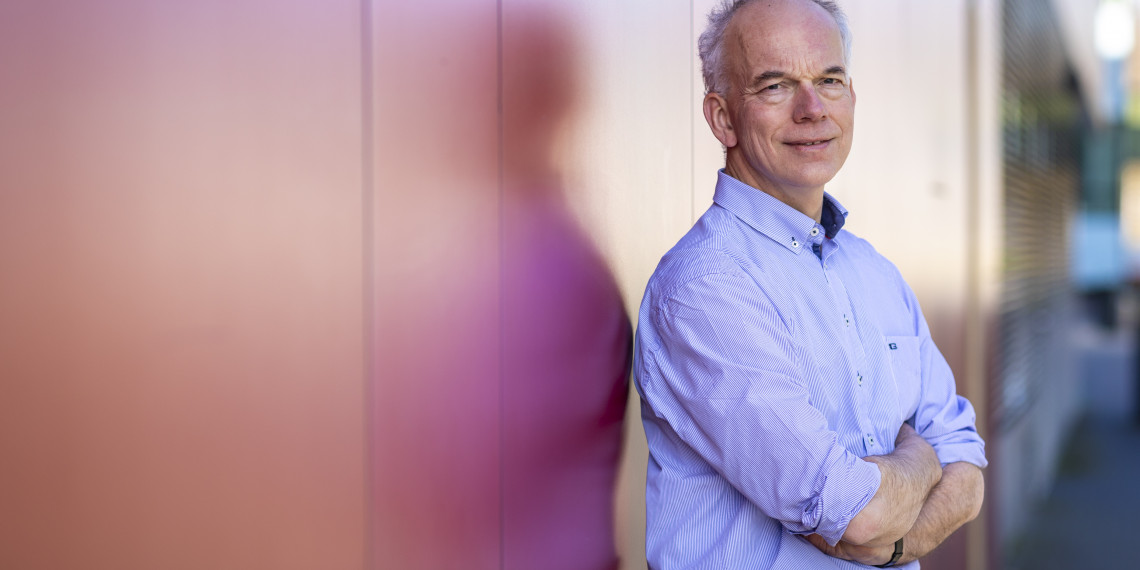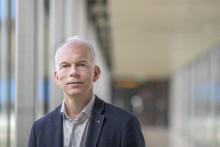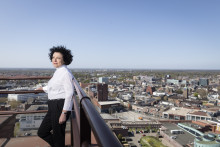‘When I applied for a job at the University of Twente of 1998, I had never supervised a big group of people before. I had just completed my habilitation at the Universität Marburg, which in Germany those days was a necessity to become professor. After a long day, I was browsing through the journal Physics Today. A vacancy from the University of Twente - which I was not familiar with at that time - caught my eye. They were looking for a professor in Multiphase Flow. I had never worked on that subject, but multiphase flow is nothing else but bubbles or particles in turbulence. As I did have experience both with a single bubble and with turbulence, I decided to go for it and mailed off my application. Much to my surprise, I was invited for an interview.’
‘After that interview, it turned out that I had been lucky once more. I had given my application talk on single bubble sonoluminescence, the phenomenon that an ultrasound-driven gas bubble can emit light. We had found out why and when this is the case, and apparently also the appointments committee was convinced. As I heard years later, the setting had been perfect for me: the candidate who had given his application talk just before me had also talked on single bubble sonoluminescence, but referred to it as a ‘big mystery,’ thereby unknowingly perfectly setting up the scene for me.’
‘I have always had a passion for science. As a child in Hamburg, I had set up a chemistry lab in the basement of our house, where I experimented with sulphuric acid, ammonia and various other chemical substances. With the insight from now on the toxicity of one or the other organic liquid I used, I would by the way be hesitant to let young children freely experiment with this stuff. But I did not do unreasonable things and my father gave me the trust and freedom to do experiments, to enjoy science, and he clearly stimulated my curiosity. He was an engineer and a professor himself. He was more focused on applications than on research and he loved to teach.’
‘My father is a prime example of integrity. He was straightforward, contents-driven, and always calm and honest. I highly value those character traits and try to follow his example. I once encountered a manager who told completely opposing stories at two consecutive meetings. In response to my confusion, he said: 'Detlef, you are not a politician.’ I am fortunate in that the most important role models in my scientific life are great examples for scientific integrity. Besides my father, these include my thesis supervisor Siegfried Grossmann, my colleague Andrea Prosperetti and my predecessor Leen van Wijngaarden. Leen still visits our department nearly every day. In the twenty-two years that I have been doing research in Twente, we never had any difference in our views. It is reassuring that regardless of age, culture or background, rationality and civility tends to lead to the same conclusions.’

‘Science is like a very complex puzzle. However, one does not always have all required pieces on the table and other pieces may be wrong because they are based on incorrect measurements or calculations. I am often asked how I find the problems I work on. The answer is simple: be curious, watch, listen and be open. In the best case, the problem to work on is both relevant and outstanding, at the same time.’
‘Solving an outstanding problem requires hard and well-organised work. Talent alone is not enough. Before being able to solve the puzzle one must invest years to collect the individual pieces. Often they do not fit together; and others are missing. So you have to collect new ones, and recombine them differently. And then, all of the sudden, when you are lucky – and often at an unexpected moment – all the pieces fall together in your mind and you know that you have solved the problem. It is this moment for which you do science. I have been lucky enough to have had several such moments. Take, for example, the fun problem of the snapping shrimp. I happened to talk to a zoologist about the mysterious sound that a shrimp makes when it closes its claws. Is it caused by the two halves of the claws snapping together? When I saw the acoustic signal, I thought: ‘no, it's an oscillating air bubble that is formed when the claws are rapidly closed.’ The next step was to calculate and to measure, which confirmed my hypothesis.’
‘When I started in Twente, the Rector those days, Frans van Vught, had a vision for the UT, which as crucial element included to stimulate the scientists to acquire grants from the Dutch National Science Foundation. That worked in my favour. I have always loved to write project proposals. As Leen once put it: ‘You compose a proposal like a symphony and thus pave the path for the future research in the group.’ This brought along that the group grew and attracted talents from around the world. But also the local technicians are absolutely crucial, as they have the technical skills to bring the ideas to live. Lastly, our group manager Joanita Leferink is truly one in a million. She takes care of absolutely everything for our department. In essence, science is teamwork.’
‘My wife claims that I grew up in a very protected way. Perhaps she is right. As a child, I loved nothing more than doing science and I was given the opportunity to just follow this passion and did so. A friend wanted to take me to a disco. I went with her as a favour. We were standing in line, the door opened up and a wave of smoke and noise hit me. I turned around on the spot and left.’
‘My father passed away last summer. He was 95 years old, but still sharp and well organised. Despite his age, he stilled learned how to program in the computer language Python. I don't see many other elderly people doing that. When I received the Max Planck medal in early 2019, he attended the ceremony. He was pretty proud. One weekend before his death, I visited him at my childhood’s home to help with the gardening, because that had become difficult for him in his final months. He was a true gentleman, someone to look up to.’
‘I come from a harmonious family. In sixty-one years of marriage, never ever my parents shouted against each other or against me or my sister. My mother was a housewife. When we returned from school, she was waiting for us with a cup of tea. Her youth was difficult. She grew up during the Second World War and twice lost everything she had. She met my father while working in her family's bakery. She made it possible for my father to have his career, gave us love and stimulated her children to be all they could be. She passed in 2015.’
‘I have never felt the need for a separate private life, in addition to my life as a scientist. The two are seamlessly integrated. My best friends are scientists and my wife also has a scientific background. My children have seen early on how much intellectual satisfaction science can give. My daughter is now following a PhD program in molecular biology and my son studies mathematics. I have always done various enjoyable joint activities with my children and we are still doing so today. When they were little, we used to play soccer. We would grab the ball and walk to a nearby pitch of grass. My former neighbour, a professor himself, told me: ‘Seeing you like that makes me regret that I never did things with my kids.’

‘I do not use Twitter because I don't have the time, but I am socially involved. I worry about the age we live in and in which my children have to grow up. For the past five years or so, the Enlightenment ideal - with its sovereignty of reason - is breaking down. In the early years of the twentieth century, physicist and Nobel Prize winner Hendrik Lorentz was a Dutch national hero; today, people are obsessed with Wie is de Mol. With Donald Trump as president of the United States and populists gaining popularity throughout Europe and in the Netherlands, science and rational reasoning is under pressure. To have facts and so-called alternative facts standing next to each other on equal grounds is frightening.’
‘Science and the humanities are under heavy pressure and the government is not allocating enough funds to education and research. It is shocking to me that an essential subject like history is only an elective in high schools as we can and must learn so much from the past. As a society, we are supposed to invest into the intellectual development and the education of young people. By not doing so people become more susceptible to populists and their propaganda, like denying scientific facts like for example global warming. If this continues, we are going back to the Dark Ages.’
‘Science is an international endeavour. The people in my group came to Twente from all over the world. After their time here, they leave for new jobs around the globe, many of them as professors. My friends live all over the world. At the same time, however, I feel a strong connection to the Netherlands and to Enschede. I still have the German nationality, but I regret not to be able to vote in the country I live in.’
‘Other than that, I am completely integrated here. The North-German culture is not that different from the Dutch one, of course. I appreciate the down-to-earth mentality, openness and rationality here in Twente. The academic culture is more international here than in Germany and there is a stronger focus on excellence. I very much like this intellectual environment. However, when I look beyond science, I see serious challenges for our Western culture. My way of contributing to this is to be honest, work hard and make my voice heard in science and society'.








